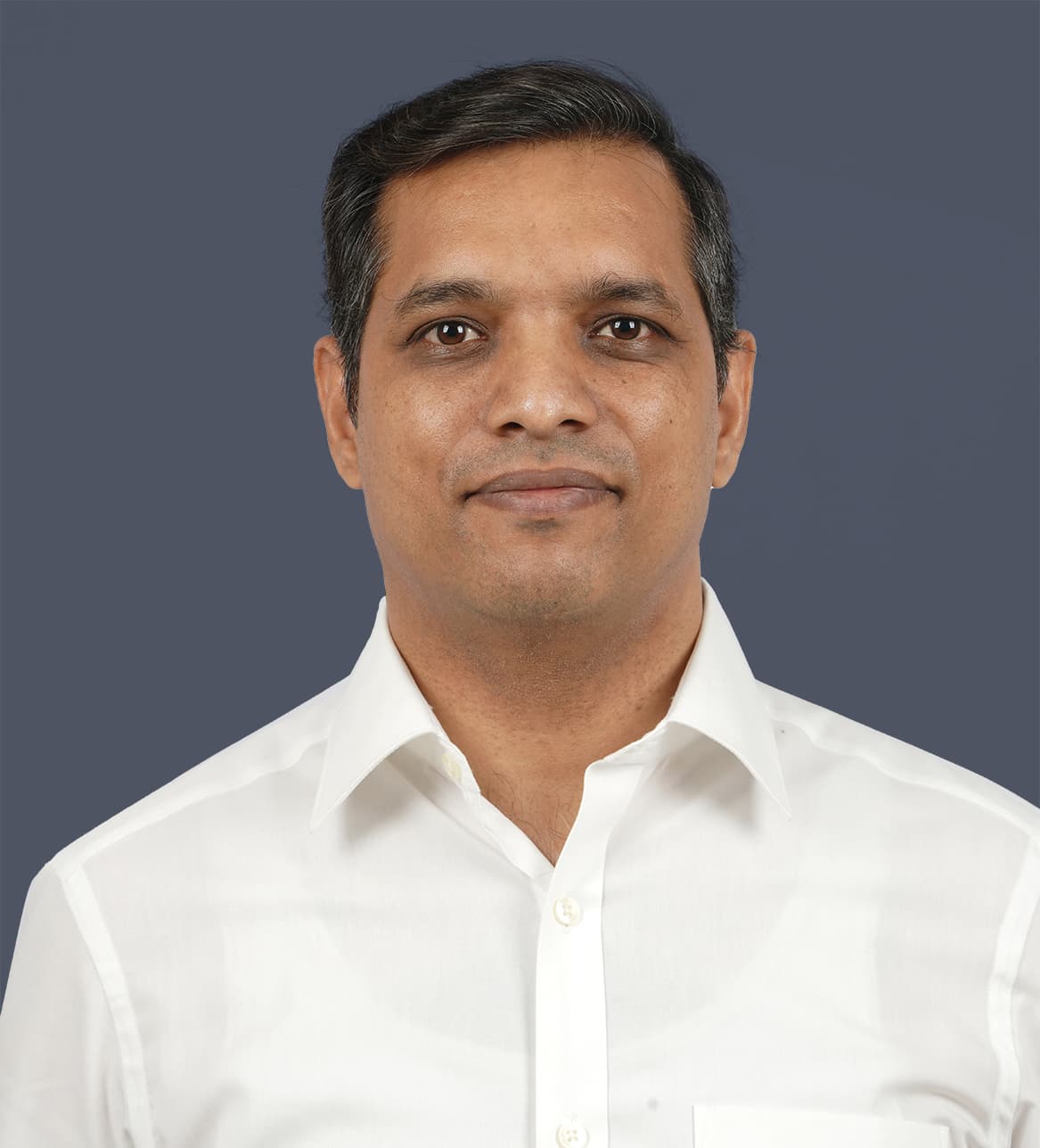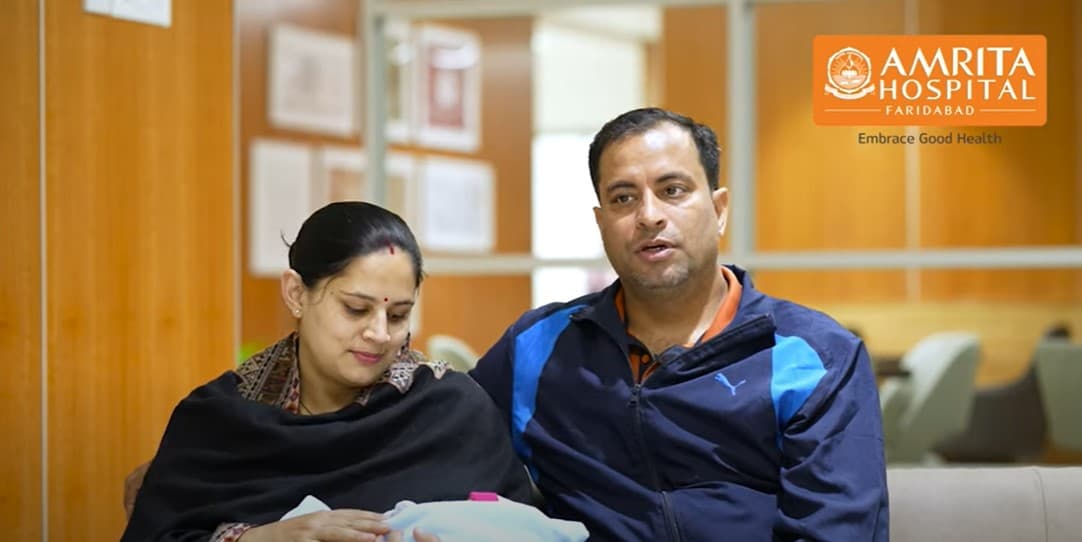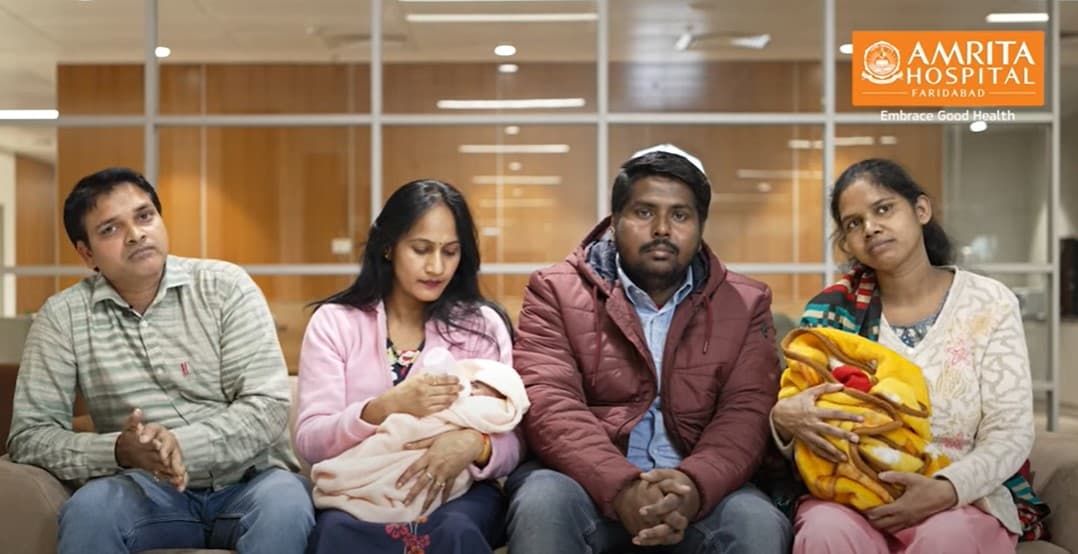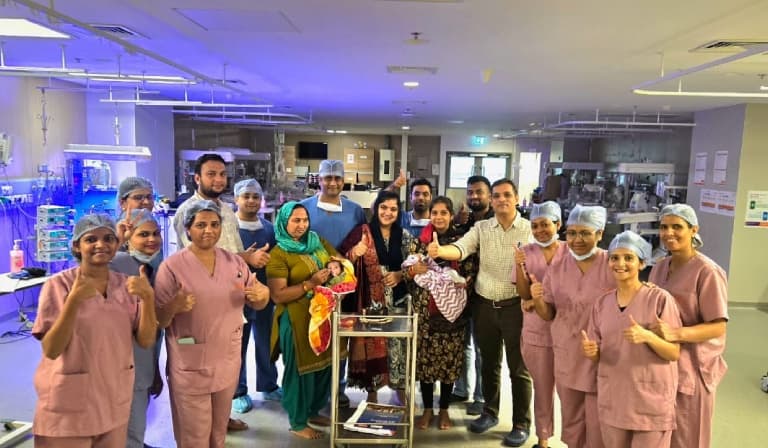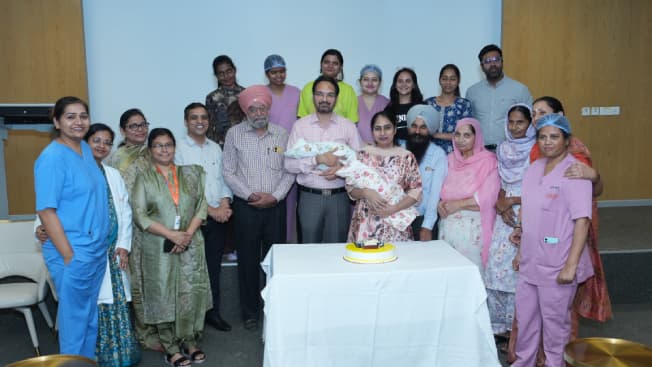Overview
The Neonatology department at Amrita Hospital, Faridabad comprises of two highly qualified Consultant Neonatologists along with other doctors who provide 24/7 in-house coverage and a dedicated Neonatal transport service. We are supported by experienced and committed Neonatal Nursing team. Together with our highly specialized Obstetrics and Fetal Medicine team, we form a closely-knit mother and Child unit.
Our approach involves closely following the journey of newborns through birth, admission to Neonatal Intensive Care Unit (NICU) to their homes. We monitor neurodevelopmental surveillance for high-risk newborns, ensuring their ongoing developmental progress. Additionally, we offer regular advice on Early Intervention to support their optimal development, aiming for an 'intact' survival.
We strive to provide comprehensive support and ensure the well-being of both the newborns and their families. Our commitment lies in promoting family integrated care and involving parents in care of their newborns.
Diseases Treated
- PPHN-Persistent Pulmonary Hypertension of the newborn and other respiratory failure causes
- Management of Extreme premature and Extremely Low Birth Weight neonates
- Respiratory illnesses: RDS, Meconeum aspiration, Congenital Pneumonia
- Metabolic: Jaundice, Jaundice needing Exchange Transfusion
- Cardiovascular: In house Paediatric Cardiology and Cardiac Surgery team
- Neurological: Neonatal Encephalopathy, Neonatal seizures, Genetic syndromes, Hydrocephalus
- Opthalmological: Screening and Treatment of Retinopathy of Prematurity
- Neonatal Infections
- Kidney: injury, UTI
Why Choose Us
- 24*7 cover by Neonatologists
- Neonatal transport services – stabilization and safe retrieval from other hospitals
- Multidisciplinary services-All specialties available under one roof
- Advanced Equipments
- Compassionate care with focus on families, not just neonate
- Developmental Supportive Care within NICU and post discharge
Services Offered
1.Advanced
- Stabilisation and retrieval of sick Neonates (Neonatal Transport ventilator and incubator)
- High Frequency Oscillation Ventilation
- Inhaled Nitric Oxide Therapy-(iNO)- available in only few neonatal units
- Giraffe Incubators for small premies
- LED Phototherapy units
- Peritoneal dialysis of small babies
LASER and anti VEGF for eyes
2.Basic
- Invasive (Conventional) ventilation (SLE 6000)
- Noninvasive ventilation (CPAP and HHHFNC)
- Radiant Warmers
- Ultrasound machine for head and heart scan (Bedside ECHO and Neuroimaging)
- Transcutaneous Bilirubinometer (to assess jaundice without doing multiple blood tests)
- Recliners for Mothers for Kangaroo Mother Care (KMC)
- Breast Pumps- Electrical and Manual
- Parenteral Nutrition
- Universal Hearing Screen
In addition
- Antenatal Counselling of high-risk cases
- Lactational Support- Lactational Counsellors
- Trauma Informed Neonatal Care (Developmental Supportive Care)
- Allied Paediatric sciences - Paediatric Nephrology team, Paediatric Gastroenterologist, Paediatric Cardiology, ENT Team, Paediatric Neurology team, Paediatric Neurosurgical team and others
24x7 Emergency department for out of hours Neonatal emergencies
Special Clinics
- Well baby clinic
- Outpatient services along with immunisations
- Neurodevelopment follow up of high-risk Newborns -with Occupational Therapist, Opthalmology team, Audiologist etc
Gallery
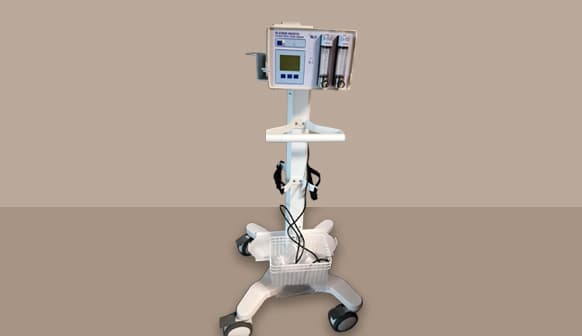
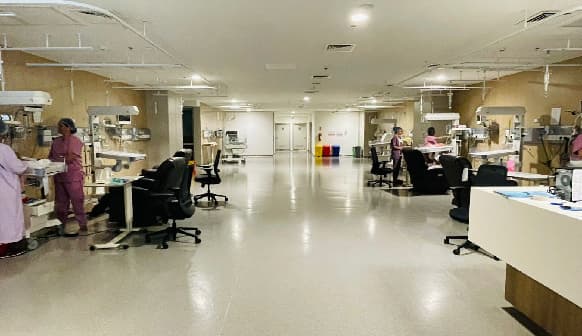
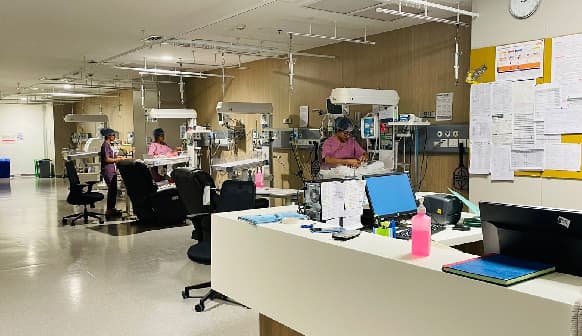
Facilities Available
Our NICU is a 22 bedded unit though we are planning to expand in Phase II to include many more beds (both Intensive and Special Care). Currently, we have 3 separate areas – 11 NICU beds (Neonatal Intensive Care unit), 6 Special Care Nursery beds, 3 beds in a separate Isolation area for extramural births. In addition, to facilitate zero separation between Mother and baby we have 2 separate M-NICU rooms (Mother-NICU). In M-NICU, mothers can stay alongside their sick baby even if the baby is on respiratory support. This concept engages and empowers parents in looking after their sick babies and serves as a good infection control measure too.
We are strong advocates of Breastfeeding and have a separate room for Mothers to rest and express their breast milk. Our Neonatal Intensive Care Unit is equipped with state-of-the-art equipment including world-class ventilators including:
- Invasive (Conventional) and non-invasive (CPAP and Heated Humidified High Flow Nasal Therapy)
- High Frequency Oscillation and Nitric Oxide Therapy
- Multipara monitors Giraffe Incubators and Radiant Warmers Intensive (LED) Phototherapy Units
- Laminar Flow for Parenteral Nutrition and medicines Bedside Cranial (head)
- Ultrasound machine for head and heart scan (ECHO)
- Transcutaneous Bilirubinometer (to assess jaundice without doing multiple blood tests)
- Recliners for Mothers for KMC (Kangaroo Mother Care).
FAQ
Parents are not visitors. We firmly believe in Family Integrated Care and encourage mothers to attend 24 x7 for breastfeeding, expression of milk using breast pumps, Kangaroo mother care (KMC) etc. Fathers are allowed to attend one hour in morning and one hour in evening.
Babies (if sick/born early) are usually fed by an orogastric tube. We have pumps for mothers to express their breastmilk and the same is given through this tube. Once suck swallow coordination develops, they transition to oral feeds via a paladai (small katori) or breastfeeding.
If babies have a stable neonatal course and have a normal imaging of brain at discharge, good tone, then there is a good likelihood of these babies developing well. However, development of brain and baby is an ongoing process and its something we monitor on follow up through regular surveillance visits.
We have all the allied specialities under one roof and work in a multidisciplinary team and hence a team-based approach is beneficial for you and your baby. We are there with you in this journey in taking care of your little one right from birth to discharge.
Breastmilk is the best for your baby and it’s the first vaccine you can give to your baby to offer protection against many illnesses. Initially mothers produce Colostrum in the first 2-3 days which is very good for your baby.
Please put your baby to breast every 1.5-2 hours even if there is isn’t enough milk or baby doesn’t suck well. Skin to skin contact enhances milk production.
Soaps, shampoos, Cosmetics including Talcum powder are not advised before 6 months of age. Only Coconut oil for massage and Diaper rash cream maybe used. Initially babies should be bathed with plain water only. Bathing should commence ideally a day after the cord falls off.
The cord needs to be kept clean and dry. Initial few days, till the cord falls off, you can do sponging for your baby and delay bathing.
Our Emergency services are open 24*7 with one of us always in the hospital. If your baby doesn’t feed well, has cold hands and feet, appears dull, passes less urine (less than once per 4-6 hours) or you have any other concerns, please attend your nearest Emergency department asap. You may also call on our Neonatal Helpline number at Amrita- 09289654067
Patient Stories
Special Clinics
- Neonatal Intensive Care
- Neonatal Special Care
- Well baby clinic
- Outpatient services along with immunisations.
Contact Us
+91 9289654067
